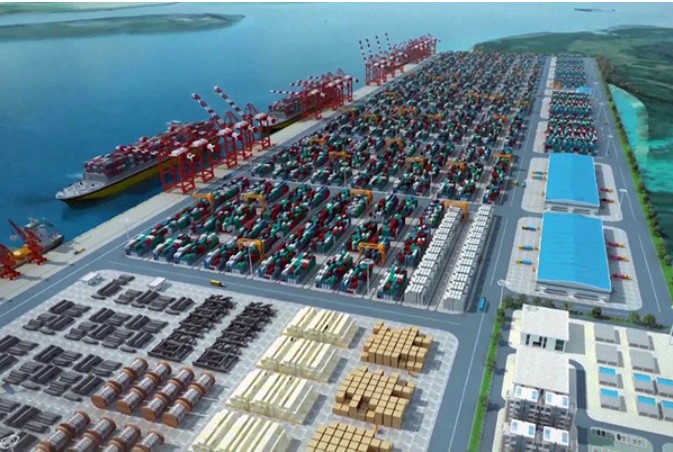From Anthony Nwachukwu, Lagos
Lekki Port will facilitate trade volume growth for Nigeria and increase the Gross Domestic Product (GDP) as part of its macro-economic benefits to the economy, the Managing Director of Lekki Port LFTZ Enterprise Limited (LPLEL), Mr. Du Ruogang, has said.
Ruogang told newsmen Monday at the Lagos Free Zone in Ibeju Lekki during the commissioning of the port that the facility remained a game-changer that would redefine maritime activities in Nigeria and the entire West African sub-region.
Disclosing that commercial operations would commence at the facility by end of Q1 2023, Ruogang listed the other benefits as improvement of external trade competitiveness through improved port efficiency, and cost-efficient port operations and services.
The others include improved turnaround time for cargo handling and clearance, a reduction in delays in the supply of raw materials and equipment, as well as reduced cost of importation and charges such as demurrage.
“With Lekki Port, Nigeria will witness a growth in maritime traffic and global trade and strengthen connectivity and capability to provide efficient and reliable services,” Ruogang said.
“Lekki Port will be a critical engine that will drive the Nigerian economy upon commencement of operations. I am equally confident that it would help to reinforce Nigeria’s status as a regional maritime hub and enable many related industries to flourish.”
The Chief Executive Officer of Lekki Freeport Terminal, Mr. Denrick Moos, also noted that in addition to its state-of-the-art infrastructures, Lekki Port will become a new generation container terminal, a game-changing infrastructure in Nigeria and West Africa.
Nigeria’s first, the deep sea port is equipped with 13 quay cranes for a capacity of 2.5 million Twenty-Foot Equivalent Units (TEUs) on a 1.2 kilometre quay, with a depth of 16 metres, and will operate vessels with a capacity of up to 15,000TEUs and become one of West Africa’s largest.
The Lekki Freeport Terminal is operated by CMA Terminals – a subsidiary of the CMA CGM Group. Through the its new container terminal, the CMA CGM Group will further develop its presence in Nigeria and further consolidate its African global shipping and logistics network.
Meanwhile, Governor Babajide Sanwo-Olu said the project was a big testament to the state government’s commitment to supporting the provision of necessary infrastructure to improve Lagosians’ economic fortunes by providing thousands of jobs and impacting lives positively.
Also, the Chairman of Lekki Port, Mr. Biodun Dabiri, thanked the president and his team for giving all the necessary backing that ensured that the project came to fruition. He stressed that the management was working round the clock to get the port operational soon.
“We owe a great deal of this success to the visionary leadership of President Buhari, who provided the much-needed support to make the project a reality,” he stated.
“We are immensely grateful to President Buhari, Governor Sanwo-Olu, and all other stakeholders for their role in the actualisation of the port.
“For us, we would continue to be willing partners in the quest to achieve significant economic growth by investing in Nigeria.”
Lekki Port, a major legacy of Buhari’s administration – Sambo
From Anthony Nwachukwu, Lagos
Completed and commissioned within 45 months of the signing of the Letter of Intent by partners, the wide-impact Lekki Deep Seaport stands out as one of the major legacies of the President Muhammadu Buhari administration, the Minister of Transportation, Mu’azu Sambo, has said.
Speaking at the Lagos State banquet for Buhari after the commissioning of the port, Sambo said the commissioning was made possible by the president’s expeditious handling of all requests from the Federal Ministry of Transportation concerning the port project.
“This project will go down as one of the major legacies of this administration,” Sambo said. “In addition, this project will make an immense impact on the nation’s economy, generating about $350 billion in revenue.
“I, therefore, say big congratulations to Mr. President, the Federal Ministry of Transportation, the Nigerian Ports Authority, the investors and all stakeholders on the accomplishment of this milestone.”
According to him, the fact that the letter of intent between the proponents of the port and the financial partners was signed just in April 2019 and by January 2023 the wide-impact project was already being commissioned, is testament to the ministry’s tenacity of the purpose through the NPA.
“Added to these was the unprecedented promptness with which the President approved the ministry’s extraordinary request to designate Lekki Deep Seaport as Customs Port and approved wharf and its publication in the Federal Government Official Gazette in record time,” he added.
“With seaports being under the exclusive legislative list, the NPA’s provision of a sinking fund for Lekki Deep Seaport Federal Government’s equity contribution gave this project the necessary statutory cover and financial guarantee, in line with the law.
“Completing a project of the magnitude and impact of a deep seaport in a record 45 months shows the effectiveness of tenacious ministerial supervision, strict regulatory oversight and strong presidential backing.”
Sambo further stated that the port would be generating 170,000 jobs, going by the number of direct and indirect labour employed since the project commenced.
Sambo noted that one of the features of the facility is full automation, which would enhance the competitiveness of Nigeria’s exports in the international marketplace.
According to him, the port’s “distinctive features, such as full automation, which positions it for quick cargo and vessel turnaround, will greatly enhance the competitiveness of Nigeria’s exports, especially agro-allied products, in the international marketplace. It will also “position Nigeria to maximise the opportunities inherent in the African Continental Free Trade Area (AfCFTA) Agreement.”



